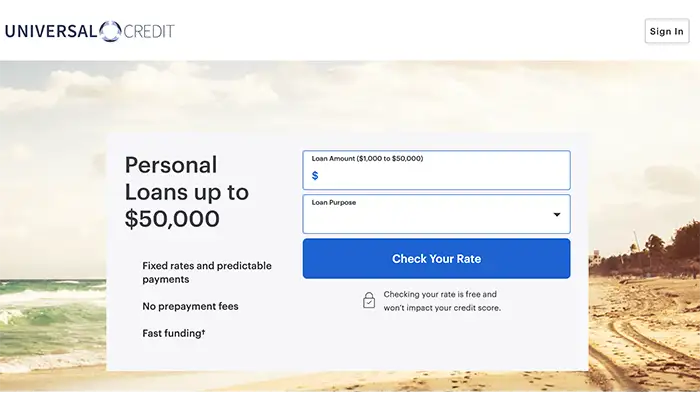This comprehensive guide provides everything you need to know about Universal Credit Loans, including basic facts about the company, who qualifies for one of their loans, what you might pay in interest, and how it could fit into your financial situation.
You might pay higher APRs than if you qualified for other lenders, but Universal Credit Loans is a transparent and reputable online loan option for those with fair or poor credit.
In This Article
Pros & Cons
Pros
- Caters to a range of borrowers, particularly those with poor or bad credit scores
- Loan sizes from $1,000 to $50,000, suitable for a variety of needs and budgets
- Provides a fixed interest rate, so there are no surprises about monthly payment amounts
- Simple and straightforward online application and account management platform
- Known for quick loan funding, often just one business day after full approval
- Does not charge early loan payoff fees
Cons
- Charges origination fees totaling 5.25% to 9.99% of the loan amount
- Offers only two repayment terms: 3 years or 5 years
- Charges late and insufficient funds fees ($10 each time)
How Universal Credit Personal Loans Work

Universal Credit is owned by a digital bank called Upgrade, Inc. The stated mission of both companies is to make personal loans "affordable and responsible" for all borrowers.
For that reason, loans from Universal Credit are designed to offer financial lifelines to those who won't qualify for a loan from other lenders due to subpar credit scores or a high debt-to-income ratio. While customers will pay a higher interest rate, Universal Credit is known for being transparent about fees and easy to work with.
Such flexibility makes it an appealing option for those looking to pay off high-interest debts or cover significant personal expenses such as unexpected house repairs or medical expenses.
Universal Credit is available to borrowers in all 50 states and Washington, D.C.. This geographical reach, coupled with looser approval criteria, makes Universal Credit a viable option for many borrowers.
Loan Features and Terms
- Universal Credit personal loans range from $1,000 to $50,000. This range caters to a broad array of financial needs and circumstances, further enhancing the appeal of Universal Credit.
- Loans come with a fixed interest rate from 11.69% to 35.99%, depending on your credit profile. This means that whatever the interest rate, it will remain constant for the entire duration of the loan term. This feature lends predictability for borrowers, which helps to simplify monthly budgeting.
- Borrowers can choose from two repayment terms: either 36 months (3 years) or 60 months (5 years).
- These loans charge an origination fee, ranging from 5.25% to 9.99% of the loan amount. This fee is deducted directly from the loan proceeds before they reach the borrower.
The Application Process
The process is contained to a simple and well-designed online form. It begins with a prequalification step, where the company collects basic information about the applicant to reveal what APR they qualify for without doing a hard credit pull.
To be eligible, applicants must be 18 years or older and a U.S. citizen or permanent resident. Additionally, they should possess a valid bank account and email address.
Once prequalified, applicants must then provide more information, including:
- Proof of income
- Proof of address
- Social Security Number
The formal application submission triggers a hard credit pull, which may temporarily lower the applicant’s credit score. However, the upside is the quick funding Universal Credit provides, often depositing the loan amount within one business day after approval.
The Impact of Universal Credit Loans on Credit Scores
The impact of taking a loan from Universal Credit on credit scores is a topic worth exploring. The application process involves a hard credit pull, which may slightly lower an applicant’s credit score temporarily.
However, timely repayments contribute positively to a borrower’s history of credit usage and repayment, potentially enhancing their credit score.
Moreover, a borrower’s credit profile can improve over time with consistent, on-time payments towards a Universal Credit loan, particularly if it’s used for debt consolidation.
Universal Credit also offers free credit monitoring services that help borrowers track their financial health and credit score throughout the repayment period.
Evaluating Your Approval Odds

1) Eligibility Criteria
Universal Credit evaluates creditworthiness based on certain criteria, including credit score. To qualify, applicants need to have a minimum FICO score of 560 from TransUnion. However, the APR and origination fee rate isn’t solely determined by the credit score. Other factors, including credit usage history and debt-to-income ratio, also play a crucial role.
The good news is, even borrowers with fair or bad credit and a high debt-to-income ratio up to 75% can qualify for a Universal Credit personal loan.
2) Improving Your Chances
As with any loan, the best way to improve your chances of approval is to increase your credit score as much as possible before applying. Consolidating credit card debt can positively impact your credit utilization ratios, potentially leading to a higher credit score.
Other tactics can include building a strong payment history with the three major credit bureaus, and reviewing your credit report to make sure that all information is reported accurately.
Services like Self Credit Builder can also contribute to a better credit score by incorporating rental payment history into your credit file, demonstrating responsible financial behavior and potentially boosting your credit score.
3) When To Choose Universal Credit
Choosing the right lender is a decision that hinges on multiple factors. Universal Credit personal loans can be beneficial for those willing to accept higher interest rates in exchange for less stringent qualification requirements.
Universal Credit is appealing to those who:
- Have less-than-ideal credit and are seeking debt consolidation or access to quick cash
- Value customer service availability on weekends
- Prefer managing their accounts via a web browser, including keeping track of Universal Credit charges and payments
Universal Credit’s personal loans could be a great option for those who meet the above criteria.
Making Informed Decisions
Before taking out a loan from Universal Credit (or any lender, for that matter), it’s essential to make informed decisions on both which lender you choose, and what impact the loan will have on your finances. You'll be making good choices if you consider the following:
- Review your budget to ensure you can handle the additional monthly payments that come with a loan
- Consider how a personal loan will fit into your future financial plans, possibly affecting milestones like buying a home or saving for retirement
- Assess the adequacy of your emergency fund to determine if you can maintain financial stability while paying off your loan, especially in case of unforeseen circumstances
- Evaluate if the purpose of the loan aligns with your financial priorities, such as whether it’s for debt consolidation, covering emergency expenses, or necessary home repairs. Avoid taking on any unnecessary debt
Managing Your Loan
Universal Credit makes repayments as simple and rewarding as possible. They reward borrowers with a 0.5% reduction in their APR when they set up automatic payments, providing a clear incentive for managing repayments responsibly.
Although the company does not offer an app, it has a clean and straightforward digital interface on their web-based platform, which can still be accessed on a phone's web browser. Users can view their loan balance, make a manual payment, manage autopay, or check their credit score on the platform anytime.
Flexibility with Universal Credit

Universal Credit prides itself on offering a flexible approach to finances in a few different ways:
- Borrower requirements. Credit score, debt-to-income ratio, and minimum income requirements are looser than for many other comparable lenders.
- Loan sizes. The flexibility extends to loan funds amounts as well, ranging anywhere from $1,000 to $50,000, satisfying the needs of borrowers who require either smaller or larger funds.
- Managing repayments. Borrowers can choose manual or automatic monthly payments to repay their loan with Universal Credit. In addition, they can pay off the full loan amount whenever they'd like with no early payoff fees.
- Direct Payment/Debt consolidation. If a borrower is looking to consolidate high-interest debt, they can request that Universal Credit pay their creditors directly.
Direct Payment for Debt Consolidation
Borrowers looking to consolidate their debt can choose a direct payment option, where Universal Credit pays other creditors directly on behalf of the borrower. This offers several benefits, including:
- Simplified repayment process: instead of paying multiple high-interest creditors, a borrower only has to pay Universal Credit moving forward
- More affordable monthly payments, due to Universal Credit's interest discount for the direct payment option
- Convenience of Universal Credit managing the debt consolidation directly, allowing for direct payoff of former creditors
These advantages can make managing your debt easier and more convenient through debt consolidation loans.
Moreover, Universal Credit offers the following benefits:
- Rate discounts for automatic payments
- Rate discounts for direct payments to creditors
- Reduction of financial burden when consolidating debt
- Secure and efficient transactions facilitated through BACS transfers
Avoiding Additional Charges
Avoiding additional charges is crucial in making the most of your loan. Timely payments can help prevent late fees, as a late payment on a Universal Credit loan will incur a $10 fee if it’s more than 15 days overdue. Additionally, the company charges a $10 fee for insufficient funds.
Paying off the loan early can also save money, as Universal Credit allows early loan repayments without any prepayment penalties.
Late payments or subsequent fees may increase the overall cost of borrowing from Universal Credit. Being mindful of these potential charges and planning ahead can help borrowers avoid unnecessary costs and keep their financial progress on track.
Understanding Total Loan Costs

Understanding the cost structure of your loan is crucial. The origination fee for Universal Credit ranges from 5.25% to 9.99% of the loan amount. This fee is deducted from the loan proceeds before it is paid out to the borrower.
Universal Credit personal loans have an APR range from 11.69% to 35.99%, depending on the borrower's profile and financial circumstances. Going through the prequalification process will let the borrower know what specific rate they can expect if they move forward with Universal Credit, with no impact to their credit score.
Before accepting a loan offer, it’s important to weigh these costs against those of other lenders, as Universal Credit may have higher interest rates and origination fees, increasing the overall cost of the loan.
No Hidden Fees Policy
Transparency is key when it comes to loan costs, and Universal Credit embraces this principle with a no hidden fees policy. They offer the following benefits to borrowers:
- No pre-payment penalties for paying off the loan early
- A clear, up-front understanding of fees, including one origination fee and a fixed-rate APR
- Potential savings on interest and fees by taking actions such as setting up autopay
Unlike some other lenders, Universal Credit’s transparent cost structure eliminates surprises, as there are no hidden fees. This openness allows borrowers to accurately gauge the full cost of their loan, aiding in financial planning and budgeting.
Universal Credit Borrowers' Experiences & Reviews

Borrower experiences tend to be extremely positive with Universal Credit. The company has a score of Excellent on Trustpilot with nearly 3,000 reviews – a good signal that it is a legitimate company with strong follow-through and customer service.
Many borrowers report appreciating the following aspects of Universal Credit:
- Fast and straightforward application process
- Flexible and transparent borrower requirements
- Quick lending decisions
- Speed of funding, with loan proceeds often received as soon as one business day after approval
While these highlights make Universal Credit a popular choice among borrowers, it must be noted that some customers noted less than satisfactory experiences with the customer service team, including difficulty in reaching support to cancel applications.
Borrowers have two options to contact customer service: by phone at (877) 418-9765 during business hours Monday through Saturday, and by email anytime at support-universal@upgrade.com.
Alternatives: Comparing Universal Credit to Other Personal Loan Lenders

Comparison is a critical step in choosing the right lender, and there are a few competitors to consider when researching Universal Credit. Different lenders will have different borrower requirements and rates for their loans, so it is worth taking the time to compare and contrast their offers.
For instance, Upstart offers a lower starting interest rate of 5.5% for personal loans, which may be advantageous for borrowers with fair to good credit.
Avant’s range of APRs for personal loans extends from around 10% to 36%, potentially influencing the choice of lender based on the borrower’s credit standing. Loans tend to be smaller, from $2,000 to $35,000.
The Bottom Line
From flexible loan terms to their inclusive approach and trustworthy track record, Universal Credit emerges as a viable financial solution for a broad spectrum of borrowers, particularly those with poor or bad credit.
While it’s important to weigh the pros and cons, consider loan costs, and compare with other lenders, the overall positive borrower experiences and accommodating features make Universal Credit a worthy contender in the personal loan market.
Frequently Asked Questions
Is Universal Credit Loan legit?
Yes, Universal Credit is a legitimate lender that is owned by Upgrade, Inc., and provides personal loans to those with poor or bad credit.
What credit score do you need for a Universal Credit loan?
To qualify for a personal loan with Universal Credit, you'll need a minimum credit score of 560.
Who is eligible to apply for a Universal Credit personal loan?
To be eligible for a Universal Credit personal loan, you need to be 18 years or older, a U.S. citizen or permanent resident, and have a verifiable bank account and email address. Additionally, you'll need to meet other eligibility criteria including income minimums.
How much can I borrow from Universal Credit?
The company offers loans ranging from $1,000 to $50,000. They provide a prequalification process to determine a borrower's maximum loan amount and APR.
What can a Universal Credit loan be used for?
Universal Credit offers personal loans that can be used for anything the borrower chooses. Many borrowers tend to use these loans for high-interest debt consolidation or unexpected expenses such as home repairs or medical bills.
How long does it take to get approved for a Universal Credit loan?
While it may take a few days to fully review and approve an application, the lender typically deposits funds into a borrower's account one business day after approval.
If you're using Universal Credit to consolidate debt with a direct payoff, it may take a few days for the funds to reach other creditors.






